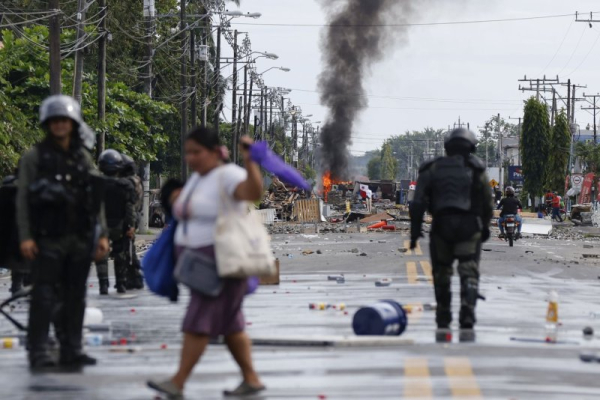

People walk along a blocked street during the day of protests in Changuinola, Bocas del Toro, Panama, this past weekend. Panama will extend its suspension of constitutional rights in Bocas del Toro province through June 29 in response to escalating anti-government protests. Photo by Bienvenido Velasco/EPA-EFE
Panama will extend its suspension of constitutional rights in Bocas del Toro province through June 29 in response to escalating anti-government protests that have left one person dead, more than 300 detained and dozens injured, including 14 police officers.
After two months of roadblocks, demonstrations and vandalism, Panama’s Cabinet Council said it was necessary to temporarily restrict the constitutional rights to free assembly and movement in an effort to restore order in the region.
On June 20, the government issued a five-day decree suspending those rights and launched a special operation that deployed 1,500 additional police officers to the province.
Bocas del Toro has become the epicenter of a deep political and social crisis in Panama, sparked by mass protests following the approval of a pension system reform and a security cooperation memorandum signed by the Panamanian and U.S. governments.
While the government has presented the memorandum as a way to strengthen security and cooperation, many Panamanians see it as a surrender of national sovereignty and a sign of U.S. interference in the country’s internal affairs.
The current unrest in Panama stems from a combination of long-standing issues — including poverty, social inequality and a lack of opportunity — that have fueled widespread protests and violence.
Rejection of the pension reform, which eliminated some benefits, mobilized teachers and workers from the U.S.-based banana company Chiquita Brands. The company ultimately shut down its operations in Panama due to the strike. While some benefits were reinstated for banana workers, other affected groups — including teachers — remain mobilized and continue to demand the full repeal of the reform.
The demonstrations, which often include road blockades and clashes, have been met with a heavy police crackdown. Violent confrontations and mass arrests have led to accusations of excessive force and due process violations by authorities. According to Panamanian media reports, young people and teenagers make up a significant portion of the protesters.
The government has defended its crackdown, claiming that “criminal gangs” and “delinquent groups” have infiltrated otherwise peaceful demonstrations.
A growing concern is the lack of information about the whereabouts of those detained, who have been transferred to at least three provinces outside Bocas del Toro — compromising their right to a legal defense, attorney José Luis Santamaría told La Estrella de Panamá.
Amid the crisis, President José Raúl Mulino has proposed a sweeping “state reform” and a constitutional overhaul. He acknowledged that the current system is “broken” and “completely collapsed,” reflecting widespread public frustration with Panama’s institutions and bureaucracy.
Still, the promise of reform has been met with skepticism. Many Panamanians have seen similar proposals fail to deliver results in the past, and distrust in the political class remains high. Critics question whether the initiative offers a real solution or merely seeks to calm public anger without addressing the root causes of the crisis.
The nationwide teachers’ strike has entered its third month, with an estimated 30,000 educators participating — roughly 57% of Panama’s public school workforce.
On June 24, the government issued a decree allowing the immediate hiring of interim teachers to fill vacancies in areas where the strike continues. The measure will remain in effect through December 2025. The teachers’ union has announced plans to challenge the decree in court, arguing it is unconstitutional.
The protests have dealt a severe blow to the economy, with daily losses estimated between $80 million and more than $100 million. The unrest has directly affected key exports, local businesses and investor confidence. Panama’s banana industry — one of its traditional agricultural and export pillars — accounted for about 17% of total agricultural export value in 2023, or roughly $140 million.
While the government maintains its growth targets, any recovery will depend on ending the blockades and restoring social order.
Although the protests have not directly disrupted operations at the Panama Canal, they have caused indirect logistical delays. Road blockades have slowed or complicated the delivery of supplies, replacement parts and essential services such as crew changes and food.
Thanks to improved water levels and operational upgrades, the Panama Canal saw a 30% increase in vessel transits and a 22% rise in cargo volume between October 2024 and May 2025, according to the Panama Canal Authority.
Including both the expanded and original Panamax locks, the canal recorded 8,057 transits over the eight-month period — up 29.2% from 6,235 during the same span of fiscal 2024.